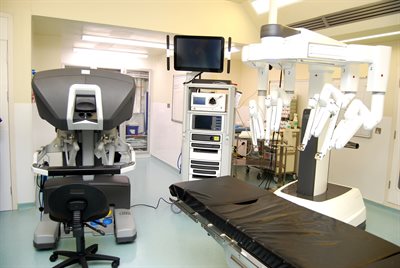Surgical Robot will support plans to improve patient care across Northants

Surgical Robot
A state-of-the-art Surgical Robot has been used in Northamptonshire for the first time this week to help improve care for patients and tackle waiting lists impacted by the COVID-19 pandemic.
The University Hospitals of Northamptonshire NHS Group – which runs Northampton and Kettering general hospitals – has invested in the £1.7m Surgical Robot as part of its clinical strategy.
Mr Hemant Nemade is a Consultant Urological Surgeon at Northampton General Hospital who will use the new robot to support cancer surgery for Northamptonshire residents.
He said: “Surgical robots have great benefits for patients. They enable us to do difficult surgeries in hard-to-reach areas with better outcomes for patients and shorter stays in hospital.
“The robot doesn’t carry out the operation – surgeons use the robot to enable more precision, flexibility and control. That means smaller wounds which heal faster and enable patients to go home earlier.
“Initially we will be focussed on cancer patients – particularly in areas with longer waiting lists as a result of the pandemic – and that will enable us to improve the way we deliver this often highly specialised surgery.
“It will also reduce the need for patients to travel to other specialist centres for difficult surgeries and be available to patients from across the county.”
Great news for continuity of patient care
Patients will also benefit if they don’t have to leave Northamptonshire to have a robotic-assisted surgery.
NGH’s Macmillan Cancer Nurse, Liz Summers, said: “We are absolutely delighted to have a Surgical Robot because it has so many benefits for our patients.
“Some specialist cancer surgeries are being carried out at Leicester at the moment. This can add additional stress for patients both in terms of travel and having to become acquainted with a totally new team of people to support them.
“Now we have the robot people can have some of those surgeries closer to home, with a team they will already know and trust. The nature of robot-assisted surgery means people will also be able to go home to recover sooner – often after a single overnight stay in hospital – and we know that is where they would rather be than in hospital.”
How it fits in with our plans to improve future care
The purchase of the robot also fits in with our long term plans to make Northamptonshire a centre of excellence for cancer care.
Northampton General Hospital’s Chief Executive, Heidi Smoult, said: “This is a major new investment and symbolises the sorts of improvements we are striving to achieve for Northamptonshire residents through our Group Clinical Strategy.
“We want to develop better care pathways for our patients, tackle waiting lists, develop high standards of clinical excellence, create a great place for staff to work and ensure the services across both hospitals are able to thrive into the future.”
The da Vinci XI Surgical Robot was installed in the main operating theatre at Northampton General Hospital at the end of February. Procedures will be available to appropriate patients from across Northamptonshire. It will be used initially in urology and colorectal surgery. Other areas such as gynaecology and head & neck cancer surgery will follow.
In the long term the plan is to increase robotic assisted surgery at both hospitals and across a wider range of specialities.
The investment in Robotic-Assisted Surgery supports the Hospital Group’s new Clinical Strategy which was launched on February 21. The strategy emphasises that both hospitals want to work together to improve care for patients across the county.
It will build on our existing collaborations within our hospitals, and with our partners. Ambitions include establishing clinical centres of excellence in the county in cancer and cardiac care; becoming a hub for research and innovation, and developing new ways to manage demand and prevent cancelled operations.
The Group plans to ask local people for their input on the strategy at number of engagement events we are planning in the near future.
Posted on Thursday 3rd March 2022